- Home
- Darrell Maloney
Texas Bound: Alone: Book 11 Page 10
Texas Bound: Alone: Book 11 Read online
Page 10
But the lines on the letters were perfectly straight.
It didn’t take her long to master the rest of the alphabet, and her “123s” as well.
By second grade she’d already memorized her multiplication tables and was writing in complete sentences.
She was well on her way to becoming another Einstein when the power went out and ruined everything.
But at least, at eight years old, she was proficient at reading and writing.
Mama was proud of her. And of Robert too, though he hadn’t quite mastered the whole reading and writing thing yet.
Monica knew her time on earth was limited.
A few weeks. Maybe a few months. But she doubted she’d see the spring.
Ronald never came back when he went back for that book. It had been days.
Early on she could convince herself that maybe, just maybe, he’d decided to walk away from them. To just rid himself of the responsibility of being a husband to a dying woman and father to a couple of young children.
It made no sense for him to do that right after their ship finally came in.
But she clung to the hope anyway.
No more. Whether he walked away or was killed, he obviously wasn’t coming back.
She knew she had to start preparing her children for her demise.
Between coughing fits she called them together.
“You’re both smart kids. And you know your daddy always used to get upset when you cried.”
They nodded their heads, not knowing exactly where she was going.
“He said that tears were a waste of time that never made anything better. He said that people who cried were weak, and that instead of crying people should get up and do something to fix things instead.”
They nodded again. They’d heard their father say those very words a dozen times or more.
“Well, there’s no denying your daddy was a terrible husband and a terrible father, but deep down inside he loved you. He loved us all. He just forgot how to show it.”
Again, they nodded but said nothing.
“I never really agreed with him on the tears thing. I always felt a good cry could make you feel better, you know?”
This time they didn’t nod. They were becoming confused.
“But maybe he was right. In any event, I’m going to tell you something you’re not going to like. I want you to try to hold back your tears. It’ll be a lot easier on all of us if you can be strong and not lose your heads.”
She took a deep breath before continuing.
“You know I’ve been sick for awhile. Very sick.”
She had to pause for one of her coughing spells. It was a spell which rocked her body to the core and hurt both sides and her back.
“Your father and I didn’t tell you how sick I was. We didn’t want to worry you about something none of us could change.
“We thought he could explain everything to you after I was gone. But that’s no longer an option.”
Despite her pleas not to cry, Beth felt the tears welling in her eyes.
She fought hard but was losing the battle. She squeezed Robert’s skinny little arm hard, as though doing so would help her be strong.
It didn’t work. All it did was make Robert pull away.
Robert’s eyes were still dry. At barely seven, he still took things at face value. He couldn’t predict where his mother was going with her conversation or what might be coming next.
“I’m dying. I’ve had leukemia for a while now, and there’s no longer any way to treat it.
“On top of that I’m pretty sure I’ve got pneumonia.
“I’ve got a few weeks left. Maybe a few months if I’m lucky.
“But even if I live a year, I won’t be much help to you. I’ll get weaker and weaker until some day I’ll just fall over dead, or you’ll go to wake me up in the morning and I’ll be gone.”
Robert said, “No,” as though his command would stop the inevitable from happening.
Beyond that, the kids said nothing.
What could they say, really, when finding out the only person in the world they loved other than each other would soon leave them?
Despite Monica’s request the tears came. And not just from Amy and Robert.
For several minutes they sat there, in the middle of the living room floor, and just held each other as their tears flowed freely.
Finally Monica pulled herself away and used her shirt to dry her face.
She never considered herself a brave person, even before she got sick.
But now she had no choice.
She had to pull herself together. She had to be the brave one; the tough one.
For all their sakes.
“Okay, now, the time for crying is over. It’s time to make our plans.”
“What kind of plans, Mama?”
“Over the next few weeks I’m going to teach you everything I know about how to survive. And you, little missy…” she said to Amy, “are going to use that amazing handwriting of yours to make notes.”
“Like I did in school?”
“Yes, ma’am. You’re going to write down everything, so that when I’m not around to help you anymore you can help yourself.”
Robert said, “But we don’t want you to die, Mama.”
“I know, honey. I promise you I’ll hold off as long as I can. But when God says it’s time for me to go there’s nothing I can do to stop it.”
Chapter 31
She didn’t push them to get started on that particular day. Just hearing her finally say what they already suspected but hoped wasn’t true was enough of an ordeal for one day.
“Tomorrow we’re going to catch the adult rabbits, one at a time, so I can figure out which ones are males and which ones are females. Then we’ll know which one we can kill and cook.”
“Mama, no…”
“I’m sorry, honey. We have no choice. We have to do it. You have to know how.”
“Do we have to watch?”
“I’m afraid you not only have to watch, honey. You have to help.”
“But why?”
“Because we learn a lot faster by doing than by watching. And I don’t have a lot of time to teach you things.”
They were disheartened. They’d come to look at the rabbits as pets and not food.
They’d have some harsh lessons ahead of them.
But it was imperative Monica leave them with the tools they’d need to survive. Otherwise they’d eat all the food stashed in the house, only to die slow and painful deaths from starvation.
And that just wouldn’t do.
“Now run along you two. Enjoy the rest of your day. Tomorrow we start work.”
They ran off, wanting desperately to put the thought of their mother’s demise out of their minds.
They wound up in the back yard, sitting in the corner beneath a pecan tree, quietly conversing to themselves.
Monica watched them for awhile, her heart breaking, wanting to intervene.
But no. This was the way they were dealing with the situation and coming to terms with it. And they needed to work it out between them. She’d be gone soon and wouldn’t be able to tend to their wounds any more. She wouldn’t be able to fix things and make things better.
It was important they learn to lean on one another to do that in her stead.
She left the window after a time, struggling to hold back her tears, and had another coughing fit so severe she almost passed out.
She went to the kitchen and started rifling through drawers until she found a pen and a notepad.
And she started making a list of things she’d need to teach her children.
At the top of the list she put:
Kill rabbit.
Gut and skin.
Stew rabbit.
Make jerky.
She put the pen down when she started hacking again.
That was enough for the next day.
Over the coming days she’d think of new things and a
dd them to the list.
There would probably be more things to teach them than they had time to learn.
She’d start with the basics first.
At least they wouldn’t starve to death or die of dysentery from drinking unclean water. For everything else, she’d rely heavily on God’s grace to see them through.
When it grew dark, Monica took the first shift on guard duty.
She sat downstairs, watching for signs of trouble, and listening to the occasional whispers of her children who were supposed to be sleeping upstairs.
She knew they were troubled.
She wanted to go to them and hold them, and to tell them they’d be okay.
But she didn’t.
It was important they learn to support one another without her help.
She let them wear themselves out.
The whispers finally stopped not long before two a.m., when they were supposed to relieve her.
Although she was beaten down, both emotionally and physically; although she was exhausted beyond belief, she let them sleep.
She struggled through until sunrise before crawling upstairs herself.
She collapsed on the bed feeling all alone in the world.
Monica and Ronald were a couple who kept mostly to themselves.
Part of it was the shame they felt, for he was a convicted felon who had a hard time finding and keeping a job. She was a little waif of a woman with low self-esteem and little prospects for any future beyond what he could offer her.
They had few friends and no relatives within a thousand miles.
Because of that they had no idea there were resources out there which could help them.
Ronald didn’t have to murder for food. The Catholic Diocese set up food kitchens all over the city and all were welcome.
The San Antonio Fire Department brought volunteer doctors to make house calls for those were truly ill.
Granted, medicines were in short supply. And Monica’s illness was terminal. But with a doctor’s help she might have stretched her life by months, maybe even years, until the children were more able to care for themselves.
And that wasn’t all. The Zavala Branch of the San Antonio Public Library was within walking distance. And it was no longer a library. It had been turned into a state-sponsored adoption agency, and they could have placed Amy and Robert into a good home upon Monica’s death.
Just up the street was a childless couple. Friends of Dave Speer. Frank and Eva Woodard would have taken Amy and Robert in and raised them as their own.
If only they knew.
Monica didn’t know any of those things were available to her, and that ignorance made things a lot more dismal than they had to be.
Chapter 32
The kids were up at the crack of dawn and immediately wondering why their mother didn’t wake them up to relieve her.
They rushed downstairs and couldn’t find her.
Their next step was back up the stairs, where they crept fearfully toward the master bedroom.
She’d left the door open.
From the hallway they could see her, sprawled across the bed and seemingly lifeless.
They froze, not knowing what to do.
“Do you think… do you think she’s dead?” Robert asked in a shaky and cracking voice.
“No, I don’t think so. She said she would teach us how to kill a rabbit today,” Amy answered as though that promise would override death’s decision to take her.
“How do we know for sure?”
“I don’t know. Should we go shake her and try to wake her up?”
“I don’t wanna. What if she doesn’t?”
They were two tiny and terrified people who were hoping for the best and fearing the worst.
Then Monica rolled halfway over in her sleep and the two tykes breathed a huge sigh of relief.
They could have run toward their mother. Could have crawled into bed with her and hugged her to show how happy they were she was still alive.
Instead they ran down the stairs and into the back yard, as though they’d seen a ghost.
They weren’t sure why, exactly, for the science of the mind was something impossible to grasp given their youth.
Subconsciously, though, they were starting to think of their mother as more dead than alive. Their young minds, when faced with her impending demise, were already trying to separate them from her, to make their grief easier when she really passed.
They didn’t understand any of that. They couldn’t.
They were just happy this wasn’t the day they found her dead.
Monica awoke about eleven a.m., but stayed in bed for another hour.
Every time she moved she felt like throwing up.
Every other time she moved she started coughing ferociously.
Every third time she moved her body was wracked with pain.
When she finally made it downstairs she swallowed three ibuprofen tablets, knowing it would help a little but not much.
Amy volunteered to make her lunch; Robert brought her a fresh bottle of water.
She drank it and led Amy onto the back porch.
Although Monica had always prepared their meals and taken care of them before, she was aware it was time for the tables to turn. For if her kids couldn’t care for her in her last weeks or months they would be unable to care for themselves after she was gone.
“Thank you,” she told them both.
Monica supervised while Amy took out the one-burner camp stove and turned the propane valve just a bit.
“Just until you hear the gas hissing,” Monica instructed.
Then she had Amy spark a fireplace match and hold it at arm’s length to light the gas, then put a pot of water on to boil.
She added Ramen noodles to the pot when it started to boil, then took it off the fire after four minutes.
“Don’t ever drain the water,” Monica told her. “A lot of people drain the water and eat the noodles dry. But that wastes the water you drain off of them. Water is way too precious to waste, so we’ll let it cool for a few minutes and then eat it as soup.”
Lesson one was complete.
While they waited for their soup to cool, Monica had Amy get a spiral notebook and pencil from Beth’s room.
“Now, then. Write down what you learned, and let me see it when you’re done.”
Amy wrote, in a childish scrawl:
Cooking Rommin Noodles: Turn on gas only until it hisses. Hold liter way out. Cook foar mints. Don’t drain water it’s to spensive.
Many parents wouldn’t have been able to stop themselves; instead of praising Amy for her thorough note taking they’d have corrected her for her spelling mistakes.
Monica was better than that.
She wasn’t the most educated or smartest person she knew.
In fact, she only noticed one of her daughter’s misspellings.
But she was smart enough to realize that praise would encourage her; correcting things which didn’t matter in the grand scheme of things would discourage her the next time she was called upon to take notes.
In that respect Monica was a lot smarter than many who might be “higher educated.”
Besides, Monica reasoned, if the words Amy put on paper made sense to her, they’d serve a useful purpose whether they were correctly spelled or not.
After they shared lunch Monica had them each read a few pages from one of their favorite books.
It was something they’d done most days since the power went out, and was now a very pleasant habit for each of them.
Given a choice they’d have kept reading until late in the afternoon, for the youngsters were dreading what they knew was coming once they finished.
Finally Monica announced, “Okay, you two. We can’t put this off any longer. Out to the back yard we go.”
She had them put on heavy kitchen gloves to make it easier to hold onto a squirming rabbit and minimize the scratches they’d almost certainly incur.
Then the
y were given the task of chasing and catching one of the adult males.
Robert was tasked to hold the rabbit down, his head placed upon an old tree stump.
Amy bashed the creature’s head in with a small sledge hammer.
Both of them cried until Monica assured them his death was quick and painless, and much more humane than other methods.
She showed them how to skin the animal and gut it, which organs to save and which to dispose of, and how to cook it.
Monica was the only one who ate any of the rabbit.
The kids professed to have no appetite.
Chapter 33
The day before had been long and trying for Dave and his family.
The freshness of their first day was long gone. They’d all thought that the first day out would be the hardest, and that once they got used to logging twelve miles a day it would get easier as they went.
In fact the opposite was true, for they were expending more energy each day than a couple of good meals and a good night’s sleep could replenish.
As a result their muscles were more tired as they set out each morning than they were at the same time the day before.
The miles they were putting beneath their feet had the cumulative effect of wearing them out physically.
Their emotions weren’t unscathed either.
They were seeing and focusing on a target on the horizon… a curve, the crest of a hill, a stand of trees, and then working for an hour or more to reach that milestone.
Only to have to focus on a similar curve, or crest, or stand and have to do it again.
Doing that ten times a day was wearing on them psychologically, for it seemed they were getting nowhere.
The one bright spot the previous day was seeing a sign which told them the interstate highway: I-335, was only two miles away.
They’d been traveling on two lane roads since they left Ely, and that in itself was its own kind of stress.
Two lane roads were more dangerous.
There were no clear zones on either side. The forest came right up to the shoulders of the roadway. There were thousands of trees bandits or other evildoers could hide behind to ambush them.
And no grassy medians for the group to take cover in if they came under attack.

 A Perilous Journey
A Perilous Journey The Yellowstone Event: Book 6: The Aftermath
The Yellowstone Event: Book 6: The Aftermath Eden Bound
Eden Bound Without Warning
Without Warning Everything Has Changed
Everything Has Changed Rest in Peace
Rest in Peace This Changes Everything
This Changes Everything The Final Chapter
The Final Chapter It Can't Be Her
It Can't Be Her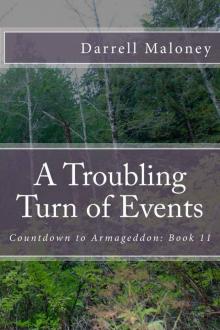 A Troubling Turn of Events
A Troubling Turn of Events The Blockade
The Blockade A Tearful Reunion
A Tearful Reunion Countdown to Armageddon
Countdown to Armageddon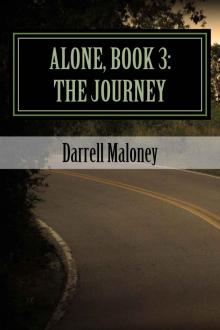 Alone, Book 3: The Journey
Alone, Book 3: The Journey The Army Comes Calling
The Army Comes Calling The Grim Reaper Comes Calling
The Grim Reaper Comes Calling Her Name is Beth: Alone: Book 5
Her Name is Beth: Alone: Book 5 Red: The Adventure Begins
Red: The Adventure Begins Rise From The Ashes: The Rebirth of San Antonio (Countdown to Armageddon Book 3)
Rise From The Ashes: The Rebirth of San Antonio (Countdown to Armageddon Book 3) An Unkind Winter (Alone Book 2)
An Unkind Winter (Alone Book 2) A Stunning Betrayal: Alone: Book 9
A Stunning Betrayal: Alone: Book 9 A Whole New World: Ranger: Book 2
A Whole New World: Ranger: Book 2 Return To Ely
Return To Ely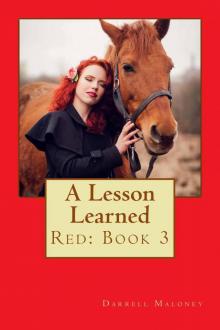 A Lesson Learned: Red: Book 3
A Lesson Learned: Red: Book 3 The Homecoming: Countdown to Armageddon: Book 5
The Homecoming: Countdown to Armageddon: Book 5 Final Dawn: Book 12: Where Could He Be?
Final Dawn: Book 12: Where Could He Be? An Acquired Taste
An Acquired Taste On Desert Sands: Alone: Book 6
On Desert Sands: Alone: Book 6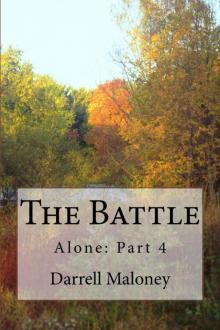 The Battle: Alone: Book 4
The Battle: Alone: Book 4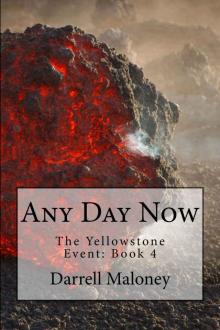 Any Day Now
Any Day Now Too Tough To Tame: Red: Book 2
Too Tough To Tame: Red: Book 2 No Help From Austin: Red: Book 5
No Help From Austin: Red: Book 5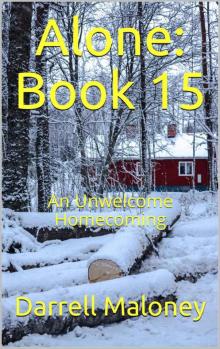 An Unwelcome Homecoming
An Unwelcome Homecoming A New Start: Final Dawn: Book 9 (Volume 9)
A New Start: Final Dawn: Book 9 (Volume 9) A Stunning Betrayal
A Stunning Betrayal An Undeclared War (Countdown to Armageddon Book 4)
An Undeclared War (Countdown to Armageddon Book 4) One of Our Own: Final Dawn: Book 11
One of Our Own: Final Dawn: Book 11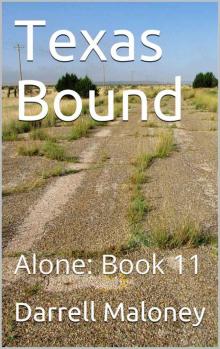 Texas Bound: Alone: Book 11
Texas Bound: Alone: Book 11 Payback: Alone: Book 7
Payback: Alone: Book 7 The Quest: Countdown to Armageddon: Book 6
The Quest: Countdown to Armageddon: Book 6 The Siege
The Siege The Yellowstone Event: Book 1: Fire in the Sky
The Yellowstone Event: Book 1: Fire in the Sky Return to Blanco (Red Book 4)
Return to Blanco (Red Book 4) The Search
The Search AFTER THE DUST SETTLED (Countdown to Armageddon Book 2)
AFTER THE DUST SETTLED (Countdown to Armageddon Book 2) Death Comes Calling (Ranger Book 3)
Death Comes Calling (Ranger Book 3)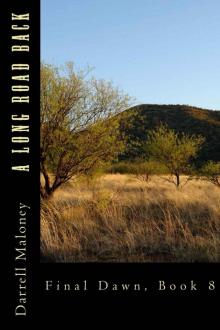 A Long Road Back: Final Dawn: Book 8
A Long Road Back: Final Dawn: Book 8